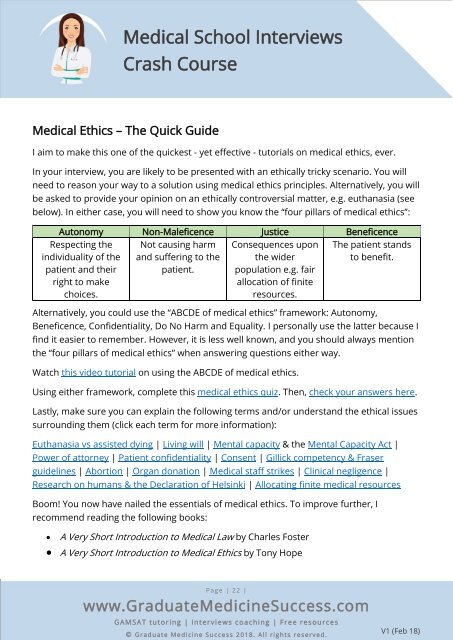InterviewsCrashCourse_Graduate Medicine Success
Create successful ePaper yourself
Turn your PDF publications into a flip-book with our unique Google optimized e-Paper software.
Medical School Interviews<br />
Crash Course<br />
Medical Ethics – The Quick Guide<br />
I aim to make this one of the quickest - yet effective - tutorials on medical ethics, ever.<br />
In your interview, you are likely to be presented with an ethically tricky scenario. You will<br />
need to reason your way to a solution using medical ethics principles. Alternatively, you will<br />
be asked to provide your opinion on an ethically controversial matter, e.g. euthanasia (see<br />
below). In either case, you will need to show you know the “four pillars of medical ethics”:<br />
Autonomy Non-Maleficence Justice Beneficence<br />
Respecting the<br />
individuality of the<br />
patient and their<br />
right to make<br />
choices.<br />
Not causing harm<br />
and suffering to the<br />
patient.<br />
Consequences upon<br />
the wider<br />
population e.g. fair<br />
allocation of finite<br />
resources.<br />
The patient stands<br />
to benefit.<br />
Alternatively, you could use the “ABCDE of medical ethics” framework: Autonomy,<br />
Beneficence, Confidentiality, Do No Harm and Equality. I personally use the latter because I<br />
find it easier to remember. However, it is less well known, and you should always mention<br />
the “four pillars of medical ethics” when answering questions either way.<br />
Watch this video tutorial on using the ABCDE of medical ethics.<br />
Using either framework, complete this medical ethics quiz. Then, check your answers here.<br />
Lastly, make sure you can explain the following terms and/or understand the ethical issues<br />
surrounding them (click each term for more information):<br />
Euthanasia vs assisted dying | Living will | Mental capacity & the Mental Capacity Act |<br />
Power of attorney | Patient confidentiality | Consent | Gillick competency & Fraser<br />
guidelines | Abortion | Organ donation | Medical staff strikes | Clinical negligence |<br />
Research on humans & the Declaration of Helsinki | Allocating finite medical resources<br />
Boom! You now have nailed the essentials of medical ethics. To improve further, I<br />
recommend reading the following books:<br />
• A Very Short Introduction to Medical Law by Charles Foster<br />
• A Very Short Introduction to Medical Ethics by Tony Hope<br />
P a g e | 22 |<br />
www.<strong>Graduate</strong><strong>Medicine</strong><strong>Success</strong>.com<br />
GAM SAT tutoring | I ntervie ws c oaching | Free res ources<br />
© G r a d u a t e M e d i c i n e S u c c e s s 2 0 1 8 . A l l r i g h t s r e s erved.<br />
V1 (Feb 18)



